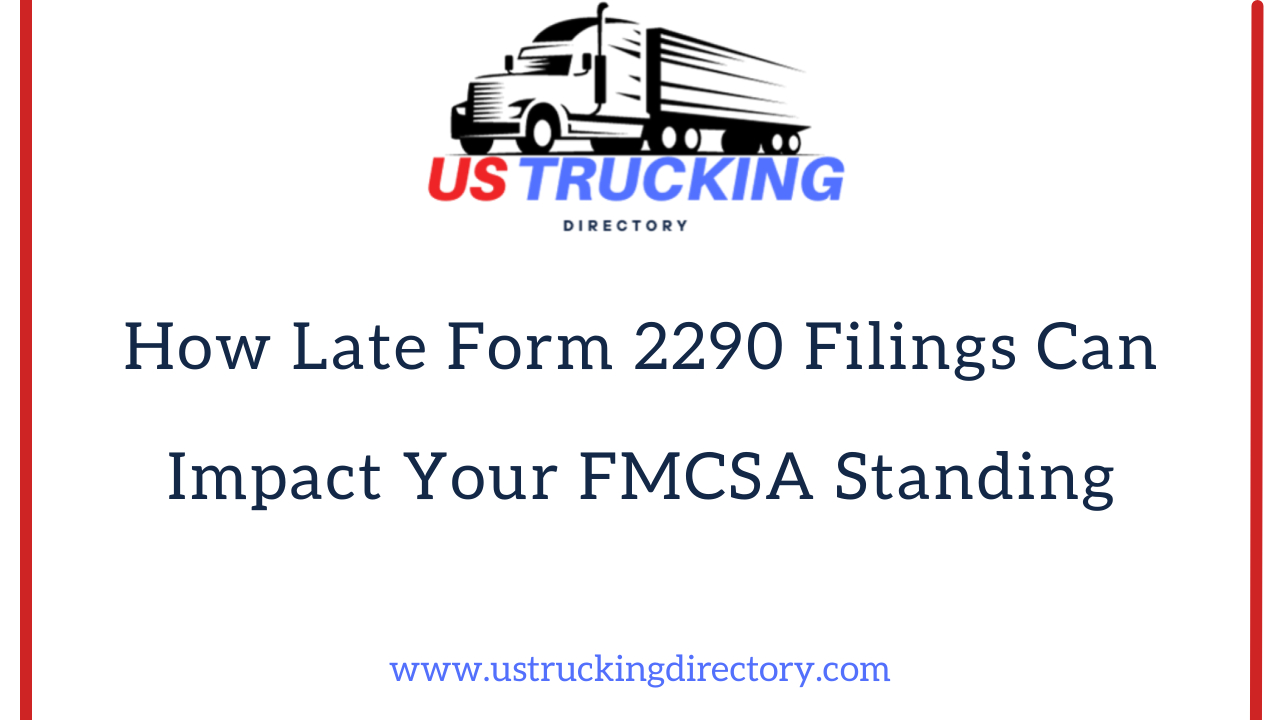Understanding Form 2290 and Its Importance
Form 2290 is a tax document the IRS requires for owners of heavy highway vehicles, which are considered any vehicles over 55,000 pounds. This form pays the Heavy Vehicle Use Tax (HVUT) that is key for trucking businesses and owner-operators. It is crucial to remember that completing Form 2290 and paying your taxes on time is crucial because it affects your legal operation in the trucking business.
The FMCSA and Your Compliance Status
Every business need to abide by the rules established by the government. The Federal Motor Carrier Safety Administration (FMCSA) manages the enforcement of safety and operational regulations of all the commercial trucking businesses. By complying with the FMCSA rules, the penalties and restrictions on the business are minimized or totally avoided. Form 2290 and other tax filings are essential because not completing them on time can lead to penalties with your FMCSA standing which can greatly impact your business at its core including licensing, registration of the business, and most importantly, your operational authority.
Consequences of Late Form 2290 Filings
1. Delays in Vehicle Registration
State Departments of Motor Vehicles (DMVs) requires as a prerequisite to registering or renewing a commercial vehicle a stamped Schedule 1 from the IRS in proof of Form 2290 payment.
Your Schedule 1 will not be issued to you if you file late. This creates the possibility that your truck may not be able to operate legally until the problem is rectified.
2. Adding Late Fees and Fines
The IRS applies late charges for untimely filings starting with 4.5% of the outstanding tax due. This qualifies for a monthly increase until it hits 25%. Further amounts payable on interest may also come into effect. This directly spells trouble for the small trucking businesses and independent owner-operators as these penalties are bound to put them under financial distress.
3. Inside Risk Compliance Circumstances with an FMCSA
Tax returns are not within the domain of the FMCSA’s prerogative in as much as truckers are concerned. However, failing to get off your vehicle’s Schedule 1’s registration or renewal leads you to violate compliance. Trucks left with no registration run the risk of FMCSA actions like audits, warnings or, in some cases, the suspension of authority to operate.
4. DOT Investigation and Roadside Check Damage Control
Officers may check the permits and registration your car has along with the pre-requisites for the form compliance within the limit of DOT investigation. If it is clear that you did not attend to a Form 2290 during the stipulated time, your registration may be marked as invalid. This puts you at the risk of being penalized financially, cited, or have your vehicle taken away temporarily.
5. Credentials Under IFTA and IRP Suspension
Permit renewals are cumbersome tasks and the IFTA is meant to assist trucking enterprises registered in different states. Late submissions tend to affect the ability to move freight across borders by making it difficult to renew IPR and IFTA credentials.
How to Not Run into Trouble with FMCSA Because of Late Form 2290 Filing Submission
1. Make Sure You File Every Year On Time
The cutoff for Form 2290 submission is the 31st of August for vehicles having first usage in July. Meeting this deadline makes sure there is no disruption in activities.
2. If You Want Speedy Processing, Use E-Filing
The form 2290 e-filing method is by far the fastest for stamping Schedule 1. It is usually sent in a couple of minutes, thus preventing registration holdups.
3. Set Reminders or Log into the Tax Compliance System
Reminder setup or use tax compliance software to keep tabs on HVUT due dates will save you from a lot of hassle.
4. Talk to Someone if You Need Help
If you missed filing on a deadline and want to ensure compliance as soon as possible, a tax practitioner can help minimize penalties.
5. Resolve The Problems of Late Filings Straight Away
In the event that you did miss the deadline, then filing Form 2290 should be done immediately to ease the amount of penalties and interest that can be accrued. Taking charge to settle this problem reduces any unfortunate consequences with the FMCSA.
Not only is timely Form 2290 submission crucial for standing with the FMCSA, it is also important for your trucking business operations running optimally. If you do not want to deal with unnecessary fines, registration, and compliance issues make sure to meet your tax obligations on time. In case of falling behind make sure to take action as soon as possible to lessen the impact on the business.
Disclaimer: The information provided in this blog post is for general informational purposes only. While we strive to keep the content accurate and up to date, we do not guarantee its completeness, reliability, or accuracy. Any actions you take based on this information are strictly at your own risk. We are not responsible for any losses, damages, or inconveniences that may arise from the use of this blog. For professional advice, please consult a qualified expert.


